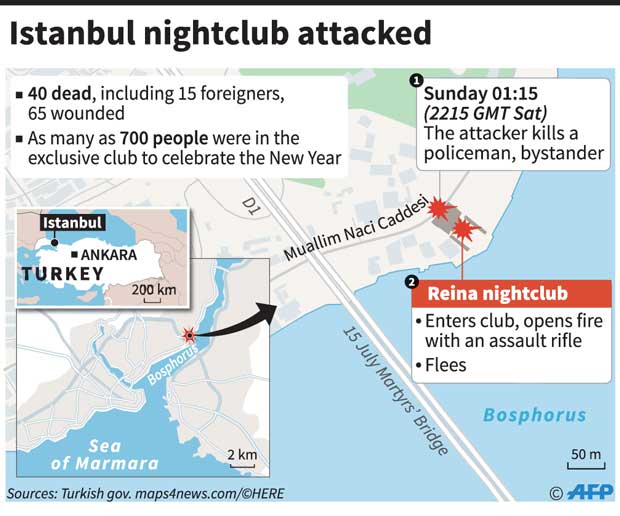06 Jan 2017 - {{hitsCtrl.values.hits}}

 Blast through 2017 was ironic, if not nightmarish and tragic. The gun attack that killed nearly 40 revellers in Turkey’s sultanate city of Istanbul two hours after the clock struck 12 could be a harbinger for things to come. One need not be an artful soothsayer or a much-sought-after political analyst to predict that the year that is six days old today will be one of chaos and bloody mayhem, despite the billions of wishes for a happy and peaceful New Year as they kissed, hugged, texted and emailed each other.
Blast through 2017 was ironic, if not nightmarish and tragic. The gun attack that killed nearly 40 revellers in Turkey’s sultanate city of Istanbul two hours after the clock struck 12 could be a harbinger for things to come. One need not be an artful soothsayer or a much-sought-after political analyst to predict that the year that is six days old today will be one of chaos and bloody mayhem, despite the billions of wishes for a happy and peaceful New Year as they kissed, hugged, texted and emailed each other.
If war is defined loosely as a violent conflict between two groups of people or an act of violence intended to compel our opponent to fulfil our will, then history is yet to see a day without a war since we formed ourselves into tribes, communities and, later, into states. According to a 2003 New York Times book “What Every Person Should Know about War’, in the past 3,400 years of recoded history, humans have been at peace for 268 years or just 8 percent of recorded history.
One wonders whether war and aggression are in the human genes. Men fight, and women, too. Perhaps, we are inherently aggressive. But the innate inclination towards aggression does not mean we are born killers.
Most human beings abhor taking the life of another human being. Even soldiers are reluctant to kill. According to a survey carried out by United States Army Colonel S.L.A. Marshall, only about 15 percent of the US infantry men fired their guns at all in battle during World War II, even when their positions were under attack and their lives were in danger. Studies have concluded that soldiers with killer instinct are rare. The sage will say nonviolence is the height of bravery or the weapon of the strongest.

Yet, war takes place. We have not fully made use of our innate potential to live in peace or make peace. This peace instinct, it appears, has been subdued by our greed for more power and wealth, our madness driven by ideological bigotry and a feeling of insecurity which makes us look at the other with suspicion. When we organise ourselves into states possessing means of military violence, this greed, this madness and this insecurity drive us to take measures which are not conducive to peace. As a result, international relations have become a continuous struggle for power.
In this power game, states resort to war – the ultimate test of power -- when diplomacy is seen as a liability and does not serve their national interests. States also resort to proxy wars to pursue their national interest goals which may include acquiring territory and protecting economic interests such as energy security, navigational routes and transnational business interests. One should not forget that states also go to war on ideological grounds or on the pretext of promoting one ideology or another to plunder other people’s resources. War is also promoted to boost arms sales which have become a major source of income for many industrial countries. Nineteenth-century Prussian General and thinker Karl von Clausewitz in a celebrated statement said, “War is not a merely political act, but also a real political instrument, a continuation of political commerce, a carrying out of the same by other means.”
Thus wars and proxy wars – whether one calls them just wars, holy wars or wars on terror -- are here to stay as long as power politics governs us. In power politics, morality has little place and, if taken into account, it is done only to achieve one’s self-centred goals. Selective morality devoid of its universal character – applicable to all cases -- is nothing but immorality and it prevents oppressed people from finding justice.
No wonder, far from us is the day when swords will be turned into ploughshares, and spears into pruning hooks, with nations refusing to lift their swords against another nation while feeling they no longer need to learn war.
This was probably why the year that passed us, like many years before it in living memory, ended up as a year of war, a year of terrorist attacks and a year that saw the rise of populism and the white supremacist rightwing, as manifested in the electoral surprises of the Brexit vote and the election of Donald Trump. By no means, could it be called a year of human rights, justice and peace. Sadly, even the only peace deal – the agreement to end the five-decade-old Colombian conflict – did not survive a referendum.
The New Year inherits more than 50 wars that defiled 2016. With the conflicts in Syria, Iraq, Yemen, Libya and Afghanistan making regular headlines not so much because of their intensity as because of big power involvement, occasionally the world was reminded that there were other conflicts crying for peace in countries such as occupied Palestine, Turkey, Bahrain, Ukraine, South Sudan, Congo, Central African Republic, Somalia, Mali, Nigeria, the Philippines, India (Kashmir) and Myanmar (Rohingiya and Karen). And there were terrorist attacks which make no country safe. With ISIS on the run in Syria and Iraq, 2017 is likely to see more terror attacks.
If these violent conflicts were the main dish at the 2017 blast-through party, then the January 20 inauguration of maverick Trump as the 45th President of the United States, arguably the world’s most powerful state, appears as the devil’s dessert. He has warned he will reverse whatever peace measures outgoing President Barack Obama has taken. They include measures to normalise relations with neighbouring Cuba and a peace resolution at the United Nations Security Council to urge Israel to stop settlement building activities and work for a two-state solution.
Trump’s promise to shift the US embassy from Tel Aviv to Jerusalem, which under international law is an occupied Palestinian city, is likely to give rise to a third Intifada or more violence in the Palestinian territory. If his tweets are anything to go by, his regime will give more priority to the security of the homeland than to human rights issues or democracy building efforts. Even in the US, democracy is likely to be at its lowest ebb under Trump. The only silver lining appears to be Trump’s cooperation with Russia to end the Syrian conflict and defeat the terror outfit ISIS.
But Trump’s friendship with Russia can also be a ruse to weaken the growing security alliance between Moscow and Beijing. Since Trump was elected on November 8 last year, he has been quarrelling with China. By keeping Russia on his side and making Taiwan happy, Trump is moving like a ruthless businessman to contain China. Whether the realities on the ground will compel him to soften his tirade against China, after he moves to the White House, is a big guessing game in world politics today.
The gloomy picture apart, the New Year is not going to be only war and more war. On January 15, France will host a major conference to give a fresh start to find a solution to the 100-year-old Palestinian crisis. 2017 marks the 100th year of the infamous Balfour declaration by which Britain allowed European Zionists to set up Israel in Palestine. Though Israel has said it will boycott the conference, a resolution based on the conference outcome is likely to be taken up before Trump takes over the White House as a UN Security Council motion.
On Sunday, we not only welcomed a New Year, but also a new UN Secretary General. One hopes the spirit of peace at the Paris Conference will give the New UN Chief Antonio Guterres the necessary energy to work towards a peaceful resolution of the world’s conflicts.
02 Jan 2025 4 hours ago
02 Jan 2025 6 hours ago
02 Jan 2025 7 hours ago
02 Jan 2025 7 hours ago